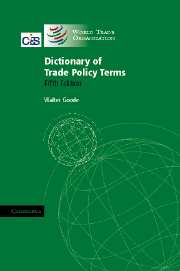Preface
Published online by Cambridge University Press: 10 November 2010
Summary
This Dictionary of Trade Policy Terms is now in its fifth edition. It contains about 600 new entries, and it is substantially different from the previous edition. I also have rewritten, either completely or substantively, about 120 entries. For various reasons many other entries have had to be updated. New expressions are being formed all the time, and at times it has been difficult to decide whether a term should have its own entry. On these occasions I have sought to form a judgement whether the term is likely to endure, at least for some years. No doubt I have committed errors both in including and omitting entries.
The WTO Doha Development Agenda (DDA) negotiations have produced new words and concepts. Progress in these negotiations has been accompanied by a rapid spread of free-trade agreement negotiations. This edition reflects this development. One example is that the dictionary now offers a fairly complete coverage of terms arising from the use of preferential rules of origin. As in past editions, I have sought to explain these terms in a form accessible to people who are not in the thick of negotiations. This means that I sometimes have had to neglect some details and nuances the negotiator cannot live without, but I hope that the result is still satisfactory for the reader.
Information
- Type
- Chapter
- Information
- Dictionary of Trade Policy Terms , pp. ix - xiPublisher: Cambridge University PressPrint publication year: 2007
